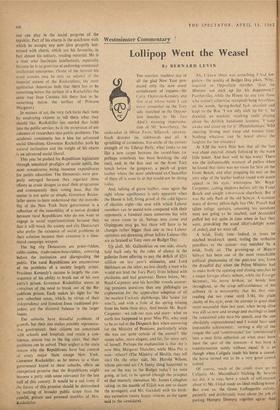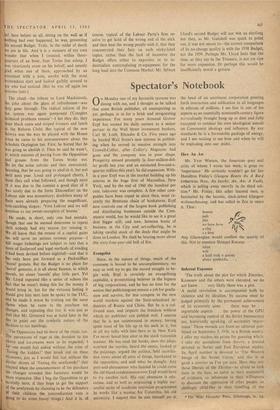Westminster Commentary
Lollipop Went the Weasel
By BERNARD LEVIN And, talking of green leather, once again the sight whose significance is only apparent when the House is full, living prbof of the cold figures of election night—the ease with which Labour members can be seated now compared with their opponents, a hundred more numerous but with no more room to sit. Swings may come and Orpingtons may go, but there will have to be changes rather bigger than one or two Labour optimists are dreaming about before Labour ribs are as bruised as Tory ones on Budget Day.
Up aloft, Mr. Gulbenkian on one side, clearly held back only by the rules of silence in the galleries from offering to pay the deficit of £211 million on last year's estimates, and Lord Hailsham on the other, no less clearly a man who would not lead the Tory Party from behind with platitudes and bad grammar. Down below, Mr. Boyd-Carpenter and his horrible vowels answer- ing pensions questions (has any philologist an explanation for the upper-class adoption of all the nastiest Cockney diphthongs, like `noines for nine?), and with a little of the spring missing from his heels these days. And beside Mr. Boyd- Carpenter—we rub our eyes and stare: what on earth has happened to poor Miss Pitt, who used to be so sad at the Despatch Box when answering for the Ministry of Pensions, particularly when she was not quite certain of the answer? She seems taller, more elegant, and far, far more sure of herself. Perhaps the explanation is that she is now Mrs. Margaret Thatcher, while Miss Pitt is now where? (The Ministry of Health, they tell me.) On the other side, Mr. Harold Wilson, whose pier-end act CA funny thing happened to me on the way to the Budget today') we were going, at last, to be spared (though the prospect of that masterly 'statesman Mr. James Callaghan taking on the mantle of Elijah was one to daunt the strongest), and Mr. Gaitskell with his birth- day carnation (many happy returns, as the agent said to the candidate). Ah. I knew there was something I had for-.
gotten—the quality of Budget Day jokes. 'Why,' inquired an Opposition member, 'does the Minister not stick up for his department?'
Panther-like, while the House (at any rate those who weren't otherwise occupied) hung breathless on his words, Spring-heeled Jack uncoiled and
leapt to the Box. 'I not only stick up for it. he drawled, an insolent, mocking smile playing about his devilish handsome features. 'I keep awake and stand up for it.' (Pandemonium. Wild cheering. Strong men weep and women faint. Nothing whatevet can be heard above the laughter for ten minutes.) At 3.20 the worn little box that all the fuss was about entered, closely followed by the worn • little boxer. And how well he has worn! There was the indispensable moment of pathos when he found that there was no room for him on the Front Bench, and after propping his seat on the very edge of the leather looked round with dumb appeal in his eyes, w hereupon Mr. Boyd- Carpenter, casting shadows before, left the Front Bench and sought /chem./mot elsewhere. But it was the only flash of the old Selwyn. A moment more of dormy pillow-fight fun (Mr. Powell had • taken refuge upstairs, assuming his questions were not going to be reached, and descended puffed but not quite in time when in fact they were, provoking the usual idiot's-delight point of order), and we were off.
A brisk, lively tone indeed, at times he reached breakneck speed, testing the verbatim pencillers to the utmost—was matched by a brisk, lively air. The growing-up of Blanco Selwyn has been one of the most remarkable political phenomena of the postwar era; from the dreadful day when the Prime' Minister had to make both-the opening and closing speeches in a major foreign affairs debate, while the Forcign Secretary, his nerve broken, sat beside him throughout, to the crisp self-conlidenee of his delivery (it is noteworthy that his first mis- reading did not come until 3.56), the plain clarity of his style even the attempt (a good deal mote successful than last year. when being alive was still so new and strange and exciting) to feed the occasional joke into his speech, and the one absolutely unprecedented and I would ha % e said impossible achievement: turning a slip of the tongue the N aid -contro■ersial for 'confidential') into a neat little aphorism on what must have been the spur of the moment- it has been A transformation surely without equal. It is as though when Caligula made his horse a consul. the horse turned out to be a very good consul indeed.
Of course, much of the credit must go to calieula. Mr. Macmillan's Sticking By Selwyn act did, it is true, have a touch of self-interest about it; Mr. Lloyd made an ideal stalking-horse- But even so, the Great Unflappable calmly. patiently and deliberately went about the job of putting Humpty Dumpty together again. And lol here before us all, sitting on the wall as if nothing had ever happened, he was, presenting his second Budget. Truly, in the midst of death We are in life. And it is a measure of my own Wonder that when I counted, within three- quarters of an hour, four Tories fast asleep, 1 Was vicariously cross on his behalf, and meanly glad when one of them, approached by an attendant with a note, awoke with the most tremendous start and looked guiltily around to see who had noticed. (But he was off again ten minutes later.) The ritual—the tribute to Lord Mackintosh, the joke about the glass of refreshment—was duly gone through. The radical reform of the tax system was again postponed ('Complex technical problems remain'-1 bet they do; they Wear black coats and striped trousers and lunch at the Reform Club). But typical of the new Selwyn was the way he played with the House When he came to his announcement about the Schedule Orpington tax. First, he hinted that he Was going to abolish it. Then he said he wasn't, at which minutes of jeering from the Opposition and groans from the Tories broke out. He let the noise subside and then announced, beaming, that he was going to abolish it, but not Until next year. Loud and prolonged cheers, I think they call what followed, and though most of it was due to the content a good slice of it Was surely due to the form. Discomfort on the Labour side was momentary; doubtless many of them were already preparing the magnificent, Vote-catching slogan: 'Vote Labour and we will continue to tax owner-occupiers of houses.'
He made, in short, only one bad mistake, though that one he seemed determine to repeat Until nobody had any excuse for missing it. We all know that the mouse of a capital gains tax will serve no serious revenue purpose-1 Will wager (winnings not subject to tax) that a score of foolproof and legal methods of evading It had been devised before nightfall—and that it has only been put forward as a Pecksniffian i'floral' gesture. But the Budget is no place for moral' gestures; it is all about finance, in which Morals, let alone 'morals' play little part. Yet Mr. Lloyd repeated like a series of echoes the fact that he wasn't doing this for the money it Would bring in, but for the virtuous feeling it Would give him next time he spoke to the TUC; and he made it worse by trotting out the same theme when he came to the purchase tax Changes, and repeating that too. It was just as Well that Mr. Grimond was at hand later in the day to point out the symbolic nature of the decision to tax humbugs.
The Opposition had its share of the ritual, too. The paroxysms of rage at the decision to tax sweets and ice-creams were to be expected; 1 f‘or One would feel naked without the cries of Taxing the kiddies!' that break out on these occasions, just as I would feel lost without the similar shouts of 'Taxing the newlyweds!' that erupted when the announcement of the purchase tax changes revealed that furniture would be more expensive. (But I beg the Opposition to go Carefully here; if they hope to get the support of the newlyweds by claiming to be the defenders O f . their children the nonconformist vote is going to do some funny things.) And it is, of course, typical of the Labour Party's firm re- solve to get hold of the wrong end of the stick and then beat the wrong people with it, that they concentrated their fury on such sticky-label topics, rather than the lack of incentive the Budget offers either to exporters or to in- dustrialists contemplating re-equipment for the long haul into the Common Market. Mr. Selwyn Lloyd's second Budget will not win an election; but then, as Mr. Gaitskell was quick to point out, it was not meant to—the correct comparison of its no-change quality is with the 1958 Budget, not the 1959. Perhaps Mr. Lloyd feels that the time, as they say in the Treasury, is not yet ripe for more expansion. Or perhaps this would be insufficiently moral a gesture.



































 Previous page
Previous page